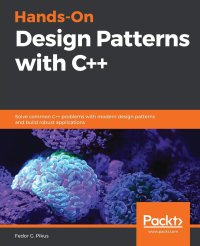
Ebook: Hands-On Design Patterns with C++: Solve common C++ problems with modern design patterns and build robust applications
Author: Fedor G. Pikus
- Year: 2019
- Publisher: Packt Publishing
- Language: English
- epub
Gain comprehensive insights into concepts such as object-oriented programming (OOP), functional programming, generic programming, and the Standard Template Library (STL), along with exploring the latest features of C++
Key Features
- Delve into the core patterns and components of C++ to master application design
- Learn tricks, techniques, and best practices to tackle common design and architectural challenges
- Understand the limitations imposed by C++ and how to solve them using design patterns
Book Description
C++ is a general-purpose programming language designed to ensure optimal efficiency, performance, and flexibility, while design patterns are commonly accepted solutions to well-recognized design problems. In essence, they are a library of reusable components, designed only for software architecture, and not for concrete implementation.
This book covers the design patterns that naturally lend themselves to the needs of a C++ programmer, focusing on essential C++ concepts and on the patterns that uniquely benefit from the features of C++, in particular, generic programming. You'll also get to grips with C++ idioms such as Resource Acquisition Is Initialization (RAII) and type erasure. Armed with the knowledge of these patterns, you will spend less time searching for a solution to a common problem and be familiar with the solutions developed from experience, as well as their advantages and drawbacks. You'll then explore how design patterns can be used as a concise and an efficient way to communicate. Since a pattern is a familiar and instantly recognizable solution to a specific problem, by using it, sometimes with a single line of code, you can convey a considerable amount of information. In addition to this, you'll understand how each pattern is used for solving a specific problem, from interface design problems through to system architecture challenges. Toward the concluding chapters, the book will guide you through some advanced design patterns. You'll also discover how you can use some advanced patterns to address more complex design problems.
By the end of this book, you will have gained a comprehensive understanding of design patterns to create robust, reusable, and maintainable code.
What you will learn
- Recognize the most common design patterns used in C++
- Understand how to use C++ generic programming to solve common design problems
- Explore the most powerful C++ idioms, along with their strengths and drawbacks
- Discover how to use popular C++ idioms with generic programming
- Understand the impact of design patterns on a program's performance
- Learn the difference between dynamic and static polymorphism
Who this book is for
This book is for experienced C++ developers and programmers who want to learn about software design patterns and principles and apply them to create robust, reusable, and easily maintainable apps.
Table of Contents
- An introduction to Inheritance and polymorphism
- Class and function templates
- Memory ownership
- Swap - from simple to subtle
- A Comprehensive Look at Resource Acquisition is Initialization (RAII)
- Type Erasure
- SFINAE and Overload Resolution Management
- The Curiously Recurring Template Pattern
- Named Arguments and Method Chaining
- Local Buffer Optimization
- Scopeguard
- Friend Factory
- Virtual Constructors and Factories
- The Template Method Pattern and the Non-Virtual Idiom
- Singleton: a Classic OOP Pattern
- Policy-based design
- Adaptors and Decorators
- Visitor and multiple dispatch